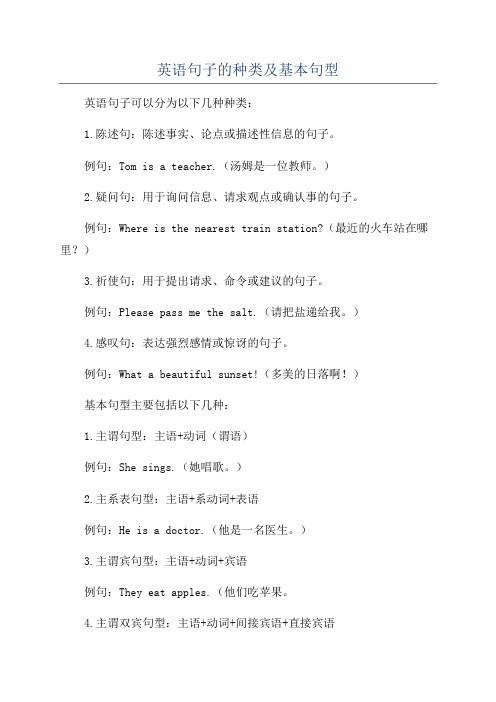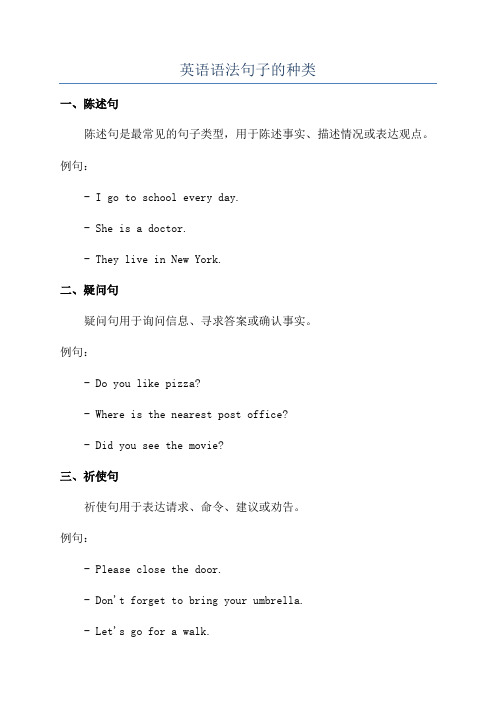最新小学英语语法----句子的种类
英语句子的种类及基本句型

英语句子的种类及基本句型
英语句子可以分为以下几种种类:
1.陈述句:陈述事实、论点或描述性信息的句子。
例句:Tom is a teacher.(汤姆是一位教师。
)
2.疑问句:用于询问信息、请求观点或确认事的句子。
例句:Where is the nearest train station?(最近的火车站在哪里?)
3.祈使句:用于提出请求、命令或建议的句子。
例句:Please pass me the salt.(请把盐递给我。
)
4.感叹句:表达强烈感情或惊讶的句子。
例句:What a beautiful sunset!(多美的日落啊!)
基本句型主要包括以下几种:
1.主谓句型:主语+动词(谓语)
例句:She sings.(她唱歌。
)
2.主系表句型:主语+系动词+表语
例句:He is a doctor.(他是一名医生。
)
3.主谓宾句型:主语+动词+宾语
例句:They eat apples.(他们吃苹果。
4.主谓双宾句型:主语+动词+间接宾语+直接宾语
例句:She gave me a gift.(她给了我一份礼物。
)
5.主谓补句型:主语+动词+宾语+宾语补语
例句:I find English interesting.(我觉得英语有趣。
)6. There be句型:There is/are+宾语
例句:There is a cat on the sofa.(沙发上有一只猫。
小学英语语法--句子的种类

句子什么是一个句子?在英语中,句子1)表达一个完整的意思;2)至少有一个主谓结构;3)首字母大写,句尾用句号、问号、或感叹号。
句子的分类:根据用途,句子可以分为陈述句、疑问句、祈使句和感叹句。
陈述句:陈述一个事实,分为肯定句和否定句(必须有否定词:not, no, never, hardly, little, few, neither, none, nobody, nothing等)。
e.g. Beijing is the capital city of China.All kids like games.Tom isn’t a girl.I have never been to New York before.Nobody likes homework.疑问句:提出一个问题。
(一般疑问句、特殊疑问句、选择疑问句、反意疑问句)一般疑问句:由助动词、情态动词或动词be开头的问句,通常用“Yes”或“No”来回答。
e.g. Do you like English? Yes, I do. /No, I don’t.Can he ride a bicycle? Yes, he can. /No, he can’t.Are they from Japan? Yes, they are. /No, they aren’t.Have you been to the museum? Yes, I have. /No, I haven’t.注意:Yes或No后面跟的简略回答中助动词必须和问句中的助动词保持一致。
一般疑问句还包括否定疑问句。
(注意答语的翻译)e.g. Don’t you know Jack?Yes, I do. (不,我认识。
) /No, I don’t. (是的,我不认识。
)Can’t he ride a bike?Yes, he can. (不,他会。
) /No, he can’t. (是的,他不会。
最新英语语法-句子的种类(史上最详细)

(二)祈使句
祈使句表达说话人对对方的劝告、叮嘱、建议、请求或命令 等。主语you通常省略,谓语动词用原形,句末用感叹号或句 号。表达请求或劝告时,祈使句句末或句首可以加上please表
示委婉的语气。
1.肯定祈使句的表现形式:
Please have a seat. 请坐。
Do型 动词原形(+宾语)+其他成分。
He was not elected as the monitor.
他没有被选为班长。
2.情态动词的否定句
I can not do it by myself. You must not take the books out.
你一定不能把书拿出去。
3.完成时的否定 I have not finished the job. He has not had his lunch yet. He had not designed any plan by the end of last month.
Let型: Let+宾语+动词原形+其他成分。 Let's go at once. 咱们马上走。
Let me try again.
让我们再试一次。 Let her tell everyone . 让她告诉每一个人 Let tom go there . 让Tom 去那边。
2.否定祈使句的表现形式: (1)Do型和Be型的否定式都是在句首加don’t构成。 ①Don’t forget me! 不要忘记我! Don’t make such a noise.
What cold weather it is! 多么寒冷的天气!
(2) how引导的感叹句 (中心词是形容词 , 副词或,动词 )
英语句子种类与类型

2、疑问句 (Interrogative sentence)
I
有一般疑问句、特殊疑问句、选择疑问句、
反义疑问句。
、 句
1)一般疑问句 (General Questions)
子 种
以情态动词,助动词或系动词Be开头的疑问句。 类
用来询问一件事,答案通常是yes或 no,注意语序。
句 子
7、目的(so that,in order that,in case) ;
类 型
8、条件(if,unless) ;
9、让步(though,although,even if,even though,in spite of the fact that ,whenever,wherever,whoever,whichever,
However,no matter how,whether) 。
3、复合句
并列复合句 即并列连词连接了带
从句的并列句。
二
、
English is widely used in the world, but China 句
has the largest number of people who speak 子
The man dressed in black seems to be a spy.
2、并列句 包含两个或更多互不依从的主谓
结构,分句由并列连词and,then,but,or,or
else,so,for,while,when;both…and,either
…or,neither…nor,not only…,but also,as
用来表达命令、要求、请求、劝告等。说话的对象 是第二人称时,you经常被省略。句末用句号或者叹号。
英语语法句子的种类

英语语法句子的种类一、陈述句陈述句是最常见的句子类型,用于陈述事实、描述情况或表达观点。
例句:- I go to school every day.- She is a doctor.- They live in New York.二、疑问句疑问句用于询问信息、寻求答案或确认事实。
例句:- Do you like pizza?- Where is the nearest post office?- Did you see the movie?三、祈使句祈使句用于表达请求、命令、建议或劝告。
例句:- Please close the door.- Don't forget to bring your umbrella.- Let's go for a walk.四、感叹句感叹句用于表达惊讶、赞美、失望或其他强烈的情感。
例句:- What a beautiful sunset!- How delicious the food is!- I can't believe we won the game!五、条件句条件句用于表达条件和结果之间的关系。
例句:- If it rains, we will stay indoors.- Unless you study hard, you will fail the exam.六、比较句比较句用于表示两个或多个事物之间的比较。
例句:- John is taller than Peter.- She sings better than him.- I prefer coffee to tea.七、否定句否定句用于否定陈述句中的内容。
例句:- I didn't see him at the party.- She doesn't like spicy food.- They haven't visited that museum before.。
英语语法句子种类与类型

英语语法句子种类与类型
英语语法中的句子种类主要有以下几种:
1. 陈述句(declarative sentence):用于陈述一个事实、观点、
情况等,以陈述句调子末尾的句点表示。
例:She is studying English.
2. 疑问句(interrogative sentence):用于提出问题,以问号结尾。
例:Is she studying English?
3. 命令句(imperative sentence):用于表达命令或请求,常以动
词原形开头。
例:Please study for your test.
4. 感叹句(exclamatory sentence):用于表达强烈的感情或感叹,以感叹号结尾。
例:What a beautiful sunset!
此外,还有一些特殊类型的句子,如:
1. 条件句(conditional sentence):用于表达假设、条件等情况,包括主从句结构。
例:If it rains, we will stay at home.
例:I like to read books, and my brother likes to watch movies.
3. 从句(subordinate clause):作为主句的一部分,常用连接词引导,包括定语从句、名词性从句和状语从句等。
例:The book that I bought yesterday is very interesting.。
小学英语语法-句子种类
含有be动词(am、is、are)的肯定句 如何改为一般疑问句?
Look and learn.(一) 1. You are a teacher. Are you a teacher?
Yes, I am./No, I’m not.
.
2.He is a cook.
Is he a cook? Yes,he is./No,he isn’t.
Let have a rest!
OK?
B.Look and write.
1.Βιβλιοθήκη ____he Is a singer?
is Yes,he___.
Is _____she a dancer? she No,____ _____. isn’t She’s a nurse.
Are ____you a student? Yes am ____,I_______.
1.Is he a girl? No, he isn’t. 2.Can you draw? Yes, I can. 3.Do you like your teacher? Yes, I do.
通过这三个例句我们可以总结出什么是一般疑问句
一般疑问句通常是以be动词、助动词、情 态动词开头,回答时用Yes或No。朗读用 升调。
否定句:
1.I am not a teacher. 2.You are not a student. 3.He is not a doctor. 4.They are not good friends. 5.It is not a pig.
什么是一般疑问句
观察一下,下面的三个句子都有什么特点。
A.Read and write Am,Is or Are. Are 1.____you a doctor? Is 2.____he a nurse? Is 3.____she a teacher? Are you dancers? 4.____ Is 5.____it an umbrella? Are 6.____they tigers? Am 7.____I a cook? 8.____they hats? Are
小学英语语法句子归纳总结
小学英语语法句子归纳总结英语作为一门国际通用语言,在小学阶段就开始学习,对于学生来说,学好英语语法是非常重要的。
本文将对小学英语语法的句子进行归纳总结,以帮助学生更好地理解和应用。
一、句子的基本构成句子是由主语、谓语和宾语等成分组成的,其中主语是句子中的主要动作或状态的执行者,谓语是主语的动作或状态,宾语是动作的承受者或者附加信息。
例句1:My cat is sleeping.(我的猫正在睡觉。
)主语:My cat谓语:is sleeping例句2:We are playing games in the park.(我们正在公园里玩游戏。
)主语:We谓语:are playing宾语:games二、句子的句型分类1. 简单句简单句是由一个主语和一个谓语构成的句子。
例句3:I like ice cream.(我喜欢冰淇淋。
)主语:I谓语:like宾语:ice cream例句4:She reads books every day.(她每天读书。
)主语:She谓语:reads宾语:books2. 复合句复合句由一个或多个主句和一个或多个从句构成,从句可以作为主句的主语、宾语或者状语。
例句5:I will go to the park when the rain stops.(当雨停了,我会去公园。
)主句:I will go to the park从句:when the rain stops例句6:She is happy because she passed the exam.(她很高兴,因为她通过了考试。
)主句:She is happy从句:because she passed the exam3. 疑问句疑问句用来提问,通常以动词或特定疑问词开头。
例句7:Do you like swimming?(你喜欢游泳吗?)例句8:Where is your pencil?(你的铅笔在哪里?)4. 祈使句祈使句用于表示命令、请求或建议。
小学英语语法讲解-句子
句子句子是由词按一定的语法结构组成的,能表达一个完整的概念的语言单位。
句子开头的第一个字母必须大写。
小学阶段要求主要掌握四种句子—陈述句、疑问句、祈使句、感叹句。
第一节:陈述句概念:是用来说明一件事情,提出一个看法,或是表达一种心情。
分为肯定陈述句和否定陈述句两种类型。
一:肯定句的几种句式:1.主语+be( am/is/are/was/were)+名词或形容词。
I am a student . She is strong and healthy.2.主语+have/has动词+其他成分。
I have a gift. He has a stamp.3.主语+情态动词+动词原形+其他成分。
Danny can fly a kite .4.主语+行为动词(原形/单三)+其他成分。
I often walk to school. Jenny eats breakfast five times a week.5.主语+行为动词的过去式+其他成分。
We went to the gym with Danny this morning.二:否定句的形式:1.主语+be( am/is/are/was/were)+not+名词或形容词。
I am not a student. She is not strong and healthy.2.主语+情态动词+not+动词原形+其他成分。
Danny can not fly a kite .3.主语+don’t/doesn’t+动词原形+其他成分。
I often don’t walk to school. Jenny doesn’t eat breakfast five times a week.4.主语+didn’t +动词原形+其他成分。
We didn’t go to the gym with Danny this morning.三、常见的否定式的缩略形式:is not→isn’t are not→aren’twas not→ wasn’t were not →weren’t do not→ don’t does not →doesn’tdid not →didn’t will not→won’t can not→can’t would not →wouldn’t must not →mustn’t have not→haven’t has not →hasn’t陈述句专项练习一、按要求完成句子:1. There are twenty –four hours a day.(改为否定句)2. Bob is a good basketball player. (改为否定句)3. She does her homework before supper . (改为否定句)4. He doesn’t like playing soccer .( 改为肯定句)5. Jenny can teach LiMing to play basketball. (改为否定句)6. I will go to the zoo by bus. (改为否定句)7. LiMing bought gifts for Danny and Jenny . (改为否定句)二、选择填空:( )1. many people in the street. A. Have B.Has C.There are D.There is ( ) 2. There 24 students in our class. A. is B. are C.have D. has ( ) 3. Bob’s team is basketball this evening.A. playB. playsC. playingD.to play( ) 4. He the ball in the net. A. puts B. put C. putting D. putting ( ) 5. Here some books about China. A. is B.are C. be D.am ( ) 6. Danny peas. A.don’t like B.don’t likes C. isn’t like D.doesn’t like ( ) 7. Jenny from Canada. es e C.are ing ( ) 8. LiMimg on the grass. A. lie B. is lie C. is lying D. lay ( ) 9. I will some flowers for my mother.A. picksB. pickC. to pickD. picking( ) 10. Everyone going to learn English. A. are B. be C. am D. is三、连词成句:1. is, someone, at, there,door, the ( . )2. eat, I,once , year, a ,cabbage.( . )3. hour ,make, an, minutes, sixty ( . )4. weren’t, at , we , yesterday, home ( . )5. no, I, sisters, have ( . )四、翻译下列句子:1.我是一个学生, 我的妈妈是一名教师。
英语语法之句子的种类
英语语法之句子的种类
英语语法中,句子可以分为以下几类:
1. 简单句(Simple Sentence):由一个主语和一个谓语组成的句子,表达一个完整的意思。
例如:“She sings.”(她唱歌。
)
5. 祈使句(Imperative Sentence):用于发出命令、请求、建议或
者提供指导的句子。
通常省略了主语而直接用谓语动词开头。
例如:“Close the door.”(关上门。
)
6. 感叹句(Exclamatory Sentence):用来表达强烈的情感、惊讶、兴奋或者其他强烈的感觉的句子。
通常以感叹词(如what、how等)开头。
例如:“What a beautiful sunset!”(多美的日落啊!)
7. 并列句(Coordinate Sentence):由两个或多个并列分句组成的
句子,它们之间用逗号、分号或连接词(如and、but、or等)连接。
每
个并列分句在语法上是相互独立的。
例如:“She likes to read, and
he likes to play sports.”(她喜欢阅读,他喜欢做运动。
)这些是英语语法中常见的句子种类。
根据实际需要和语言目的,我们
可以使用不同的句子类型来表达不同的意思。
- 1、下载文档前请自行甄别文档内容的完整性,平台不提供额外的编辑、内容补充、找答案等附加服务。
- 2、"仅部分预览"的文档,不可在线预览部分如存在完整性等问题,可反馈申请退款(可完整预览的文档不适用该条件!)。
- 3、如文档侵犯您的权益,请联系客服反馈,我们会尽快为您处理(人工客服工作时间:9:00-18:30)。
句子的种类(1)一般疑问句用来询问一件事或情况是否属实。
用yes 或 no 来回答。
(2)特殊疑问句特殊疑问句由特殊疑问词加一般疑问句构成,不能用yes来no回答。
一般用完整的回答或是直接回答疑问词的提问。
Where are you from? I am from Beijing. 或Beijing.(3)选择疑问句提供两种或两种以上的选项供对方选择,前面的选项之间用逗号分隔开来,后两项之间用or连接,回答时选择一种。
Would you like a pear, an apple or a banana ? I’d like a b anana。
(4)反意疑问句由陈述句加一个简短问句构成,简短问句对陈述句提出相反的疑问。
如果陈述句部分是肯定,后面问句就用否定形式;陈述句部分是否定,简短问句则用肯定形式。
He likes music, doesn’t he?Yes,he does. 是的,他喜欢。
No,he doesn’t. 不,他不喜欢。
He doesn’t like music, does he ?Yes,he does. 不,他喜欢。
No,he doesn’t. 是的,他喜欢。
即回答应该按实际情况来回答,实际情况是肯定的,就用yes。
否定的就用no.小学英语一般疑问句,否定句以及对划线部分提问的解题指导改为一般疑问句:先找am, is, are, was, were或can, would,放在最前面,如没有则判断是否为过去式,是则动词改为原形,句前加Did,其余照抄;不是则判断是否为第三人称单数,是则动词改为原形,句前加Does,其余照抄以上都不是,则句前加Do,其余照抄。
改为否定句:方法和上面一样,先找am, is, are, was, were或can, would,再后加not,其余照抄如没有则判断是否为过去式,是则动词改为原形,人后加didn’t,其余照抄;不是则判断是否为第三人称单数,是则动词改为原形,人后加doesn’t,其余照抄以上都不是,则人后加don’t,其余照抄对划线部分提问:①用适当的疑问词代替划线部分,②将剩余部分改为一般疑问句(注:如划线部分为主语,则用who代替,其余照抄;如划线部分为动词或动词短语,则用do代替,句前加what,再改为一般疑问句)例如:He is running now.----- He isn’t running now.---Is he running now?---Yes, he is. / No, he isn’t.They are making a puppet.---- They aren’t making a puppet.---Are they making a puppet? ---Yes, they are. / No, they aren’t.I often watch TV in the evening.------ I don’t often watch TV in the evening.----Do you often watch TV in the evening?-----Yes, I do. No, I don’t.He plays football after school. ---- He doesn’t play football after school.Does he play football after school?----Yes, he does. No,he doesn’t.We began class at 8 o’clock yesterday.------ We didn’t begin class at 8 o’clock yesterday.Did you begin class at 8 o’clock yesterday? ---Yes,we do. No, we don’t.练一练:1、填入适当的疑问词。
1) _____wallet is it? It’s mine.2) ____is the Christmas Day? It’s on t he 25th of Decem ber.3)________is the diary? It’s under the chair. 4) ______is the boy in blue? He’s Mike.5)________are the earphones? They are 25 yuan. 6)________is it today? It’s Sunday. 7)_____is this red one? It’s beautiful.8)___is it from here? It’s about 2 kilom etres away.9)______is your cousin? He’s 15years old. 10)________do you have dinner? At 6 o’clo ck.11) ___________one is fatter, the blue one or the red one? The blue one.2、对划线部分提问。
1) I can see eight rubbers in the box. _________can _____see in the box?2) My father is fine today. _______ your father toda y?3) Liu Tao is playing football in the playground. _______Liu Tao_____ in the playgrou nd?4) My birthday is on the 9th of September. _____________ your birthday?5) I’d like a nice cake for breakfast. ______________ like for breakfas t?6) That’s Nancy’s skirt. ___________ is that?3、按要求改写句子。
1) It’s a book.(改为一般疑问句)____________________________________ _2) My father is in the office.(对划线部分提问)________________________________3) Do you watch TV every Sunday?(做肯定回答)______________4) This picture is beautiful.(改为以what引导的感叹句) What ____________picture!5) Open the door for him.(改为否定句)_____________________________6) I have a big present.(对划线部分提问)_______________________________?7) There are some orange trees.(改为单数句子)__________________________________.8) we are going to see a Beijing opera.(对划线部分提问)_______________________ ?9) He has some questions.(改为一般疑问句)___________________________ _?10) They visited their relatives and friends last Spring Festival.(改为一般疑问句)_______they ______their relatives and friends last Spring Festival?二、基本句型:1.主 + 谓语动词(S+V)如: I work. You study. They swim.2.主语 + 系动词 + 表语(s +linkv +p)We are in the classroom. They look like twins.The food tastes delicious. Leaves turn green.3.主语 + 谓动 + 宾语(S+V+O) She studies English. They play football.4. 主语 + 谓动 + 宾语 + 补语(S+V+O+C) We should keep our class clean.5. 主语 + 谓动 + 间接宾语(人) +直接宾语(物)(S+V+IO+DO)My mother made me a new dress. The teacher gave us some books.三、按结构分为简单句、并列句和复合句。
1.简单句:只包括一个主语和谓语的句子。
例如:He likes swimming. We are students.2.并列句:包含两个或两个以上主语和谓语结构的句子,句与句之间用并列连词或分号来连接。
如:The food was good, but he had little appetite.(you must)Hurry up, or you will be late for school.3.复合句:包含一个主句和一个或几个从句的句子,从句有从属连词(when, while, before, after, as soon as , if, because, so, though, etc.)引导.如:The film had begun When we got to the cinema.He didn’t go to school because he was ill yesterday.练一练:连词成句4. is,the,what,weather,today,like____________________________________________5. you,me,please,could,help____________________________________________6. are,what,they,colour____________________________________________7. many,minutes,hour,there,how,are,in,an____________________________________________8. him,give,please,water,a,of,bottle____________________________________________9. to,I,put,the,ball,in,the,box,want____________________________________________there/here be结构1、there be结构表示“某时、某地存在着什么事物或人”,包括there is、there are、there was there were。
